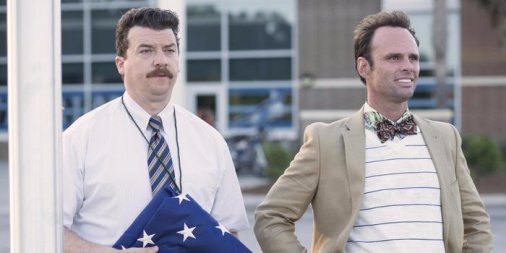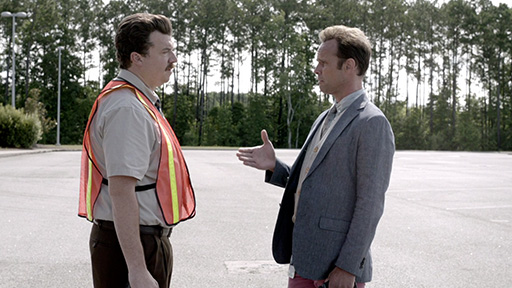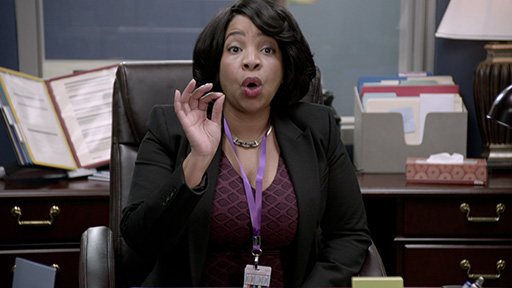The first few episodes of the new HBO comedy Vice Principals were a delight for fans of Eastbound & Down and that particular brand of angry man comedy Jody Hill & Danny McBride create so well. But despite the clear talent on display and the abundance of laughs, there was an underlying sense of predictability. Both in television and in film, mainstream comedy has traded in exploring the psychology of stunted manchildren whose absurd behavior we find comforting amusement in. When done well, you get projects like Anchorman, where peak Will Ferrell elevates idiocy into a kind of high art. On the other end of the spectrum, you have just about anything Adam Sandler has done in the last fifteen years.
Hill & McBride have hewed closer to the former than the latter with their last HBO series, and the underrated Observe and Report proved they weren’t afraid to get their hands dirty forcing audiences to confront their relationship with this brand of humor. Vice Principals began its run splitting the difference between those two projects, but is starting to gel into something more fascinating and vital than either.
The show stars McBride as Neal Gamby, an aggressive, derided vice principal at North Jackson High. Gamby is a restless authoritarian and his blunt force approach to discipline would seem downright abusive if he didn’t seem to genuinely think he was doing right by his students. The school’s principal (played by Bill Murray) steps down, and Gamby thinks his only competition is Lee Russell, Walton Goggins’ borderline sociopathic co-vice principal who’s only a few steps removed from supervillainy. Both men are so blindsided by the hiring of Dr. Belinda Brown (Kimberly Hebert Gregory) that they form an alliance to destroy her so she can move back to Philadelphia and leave them to fight over her position.
At first, this set-up seems rife for relatively good natured hijinks. Perhaps a perpetual Road Runner scenario with Gamby and Russell in the role of Wile E. Coyote. Except that by the second episode the two men have broken into her new home and burned it to the fucking ground. It’s easy to be drawn into their schemes initially, if only because, beneath their clearly disturbed exteriors, both Gamby and Russell are played by hilarious, likable performers. They’re positioned as the heroes of the piece, so it’s not difficult to side with them against this interloper.
But the show doesn’t give you any real reason to dislike Dr. Brown. If she were presented as an emasculating hardass, that’d be one thing. Instead, she seems a sincere educator who’s rightfully galled at the combined incompetency of these two delusional men. There were some quick think pieces after this big plot point about the racial undertones of a show starring two idiot white men sadistically sabotaging a black woman’s career, and if Vice Principals was a series solely dedicated to such schadenfreude, such criticism would be more than warranted.
The show’s fourth episode, “Run For The Money” rejiggered some of those complaints. The first two chapters were largely set up, but the three episodes to air since have been character spotlights. Episode three, “The Field Trip”, focuses on Gamby and forcing him to come to terms with how little he’s liked or respected among his peers. Episode five, “Circles”, takes us into Russell’s tumultuous home life. Sandwiched between them, the show slows down and spends some much needed time with Dr. Brown, who over the course of its half hour run time becomes one of the best characters on television.
“Run For The Money” catches us up on the fallout from the burnt house tragedy, as Dr. Brown has to relocate to a motel with her two teenage sons, both young black men a police officer not so thinly suggests are probably responsible for the arson. As she struggles to find her footing in this new environment, North Jackson High is caught up in its ongoing rivalry with Percival High, a neighboring school that destroys them in football on an annual basis. Gamby and Russell use the escalating series of inter-establishment pranks as cover to defile the school with crude insults directed at Dr. Brown. Because she is neither a child or an insane person, she goes to meet with the principal of Percival, thinking she’ll be able to negotiate with another woman better than the hot-headed men underneath her seem to have.
Her assumed feminine solidarity is nowhere to be found, as Percival’s leader, a bespectacled ice queen who, intentionally or not, comes off like a police sketch artist’s approximation of white feminism, reminds her of North Jackson High’s place in the societal hierarchy. She works at a school for losers, with a staff of losers, and that is her lot in life. Rather than capitulate and move back home with her tail between her legs, Dr. Brown delivers a rousing speech at her school’s pep rally, one that inspires the kids enough for North Jackson to actually beat Percival in the big game. At one point in the oratory, she begins pointing out specific students and connecting with them individually. Gamby angrily observes, “fuck me, she learned their goddamn names.”
It’s a stirring moment for Dr. Brown, one that even begins to sway Gamby a little. He hates her, sure, but he loves his school, and anyone that loves North Jackson High can’t be all bad. What makes her so special in a comedy like this is the way she’s presented. Dr. Brown is neither the henpecking wife or love interest the female lead tends to be relegated to, nor the overbearing bitch antagonist. She’s just a demonstrably more compassionate and capable person than either of the two stars of the show. You get the distinct feeling that she’s dealt with men far more difficult than Gamby or Russell to get where she is and she’s never had to resort to damaging private property when she didn’t get her way.
In “Circles”, she takes note of Gamby’s predilection towards suspension and detention as a means of performance management and ropes him into doing peer mediation with her and some of the problem students. This is a super 101 approach to education Gamby has literally never once considered. The ensuing sessions give him space to interact with his own feelings in a way he’s yet to thus far in the series. In a weird turn of events, it’s this emotional exploration that ends up repairing the episode long frienemy break-up he and Russell undergo. Dr. Brown’s mere presence in Gamby’s life is helping to make him a better man, even if initially the only benefit of that growth is strengthening his bond with the other man obsessed with ruining her life.
Vice Principals isn’t the easiest show to love, but it’s proven in its first few hours to be a more layered program than its early marketing might have suggested. It’s a comedy tackling white male entitlement in a deft way not seen since Breaking Bad. It’s given us a breakout role for Gregory in Dr. Belinda Brown and some career best moments from McBride and Goggins. Only time will tell if Hill and company are able to stick the landing, but so far, the ride sure seems worth it.
Vice Principals airs Sunday nights on HBO @ 10:30 pm




